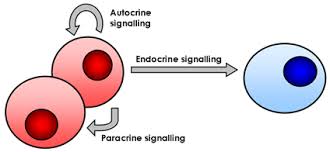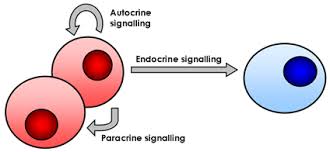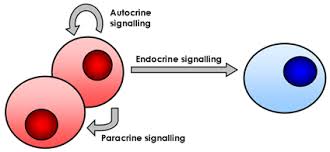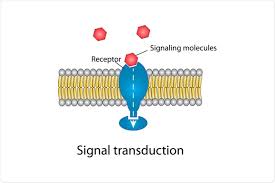Unit 4: Cellular Communication and Cell Cycle (UPDATED 11/05/24)
1/21
Earn XP
Description and Tags
Name | Mastery | Learn | Test | Matching | Spaced |
|---|
No study sessions yet.
22 Terms
Autocrine signaling
A specialized form of cellular communication where a cell releases signaling molecules, known as ligands, that bind to receptors on its own surface. This process allows the cell to self-modulate its activities and behaviors in response to internal signals, playing a crucial role in regulating functions such as growth and differentiation.

Paracrine signaling
A mechanism of communication in which signaling molecules are secreted by cells to target nearby neighboring cells. This type of signaling is vital for coordinating local cellular responses and ensuring that groups of cells can communicate effectively within a tissue or organ.

Endocrine signaling
A form of long-distance communication where hormones are secreted into the bloodstream by endocrine glands. These hormones travel throughout the body to affect distant target cells, playing a significant role in regulating physiological processes such as metabolism, immune responses, and growth.

Signal Transduction
The intricate process by which an extracellular signal, such as a hormone or growth factor, is converted into an intracellular action. This multi-step process involves the activation of receptors, communication through relay proteins, and ultimately leads to changes in gene expression or cellular behavior.

Gene Expression
The complex regulation of genes, whereby specific genes are activated or silenced within a cell. This process determines the types and amounts of proteins produced, thereby influencing the cell’s function, responding to stimuli, and contributing to the overall development and differentiation of the organism.
Receptor
A highly specialized protein located on the cell surface or within the cell that has a specific affinity for certain signaling molecules (ligands). When a ligand binds to its corresponding receptor, it triggers a series of intracellular changes that initiate a cellular response, effectively acting as a gatekeeper for signal transduction.
Ligand
A signaling molecule released by a cell that specifically binds to a receptor, initiating a signal transduction pathway. Ligands can include hormones, neurotransmitters, growth factors, and other types of chemical messengers, each influencing various cellular responses depending on their receptor interaction.
Relay Proteins
Proteins that serve as essential intermediaries in the signaling pathway, facilitating the transfer of informational signals from activated receptors to downstream targets within the cell. They play a critical role in amplifying signals and propagating responses throughout the signaling cascade.
Second Messenger
Small, often water-soluble signaling molecules released within the cell as a result of receptor-ligand interactions. They act to amplify and disseminate the signal initiated by an external ligand, leading to various intracellular effects, including changes in cell function or behavior.
Transcription Factor
A type of protein that binds to specific DNA sequences to modulate the transcription process from DNA to messenger RNA. Transcription factors play critical roles in regulating gene expression, thereby influencing various cellular processes such as development, differentiation, and response to environmental signals.
Signaling Cascade
A sequential series of biochemical reactions and events that occur within a cell following the activation of a receptor by a ligand. This cascade typically involves multiple relay proteins and second messengers, leading to a significant amplification of the initial signal and culminating in a specific cellular response.
Protein Kinases
A diverse family of enzymes that play a pivotal role in signal transduction by transferring phosphate groups from ATP to specific target proteins. This phosphorylation can activate or deactivate proteins, fundamentally regulating several cellular processes including metabolism, cell division, and apoptosis.
Ligand Binding
The initial event in the signal transduction process where a specific signaling molecule (ligand) attaches to its corresponding receptor on the cell surface. This interaction often triggers a conformational change in the receptor, setting off a cascade of intracellular signaling events.
Receptor Activation
The subsequent structural change that occurs in a receptor following ligand binding. This activation enables the receptor to engage with intracellular signaling pathways, initiating a series of biochemical events that result in the modulation of cellular functions.
Cellular Response
The ultimate outcome of signal transduction processes, which encompasses a range of changes within the cell such as alterations in gene expression, modifications in metabolic pathways, and shifts in cellular behavior or function, thereby allowing the cell to adapt to environmental changes.
Hormones
Chemical messengers produced by endocrine glands that travel through the bloodstream to regulate various physiological processes in the body.
Signal Amplification
The process by which a small number of signaling molecules can elicit a large response within the cell, often facilitated by second messengers and signaling cascades.
Insulin
A hormone produced by the pancreas that regulates glucose levels in the blood by facilitating the uptake of glucose into cells.
Cytokines
Small proteins released by cells that have a specific effect on the interactions and communications between cells, particularly in immune responses.
Phosphorylation
The addition of a phosphate group to a protein, often mediated by protein kinases, which can alter the activity, function, or location of the protein.
Feedback Mechanism
A regulatory process where the output of a system feeds back into the system to regulate its activity, which can be positive or negative.
Nuclear Receptor
A class of proteins that, upon binding to specific ligands, translocate to the nucleus and regulate gene expression by acting on DNA.